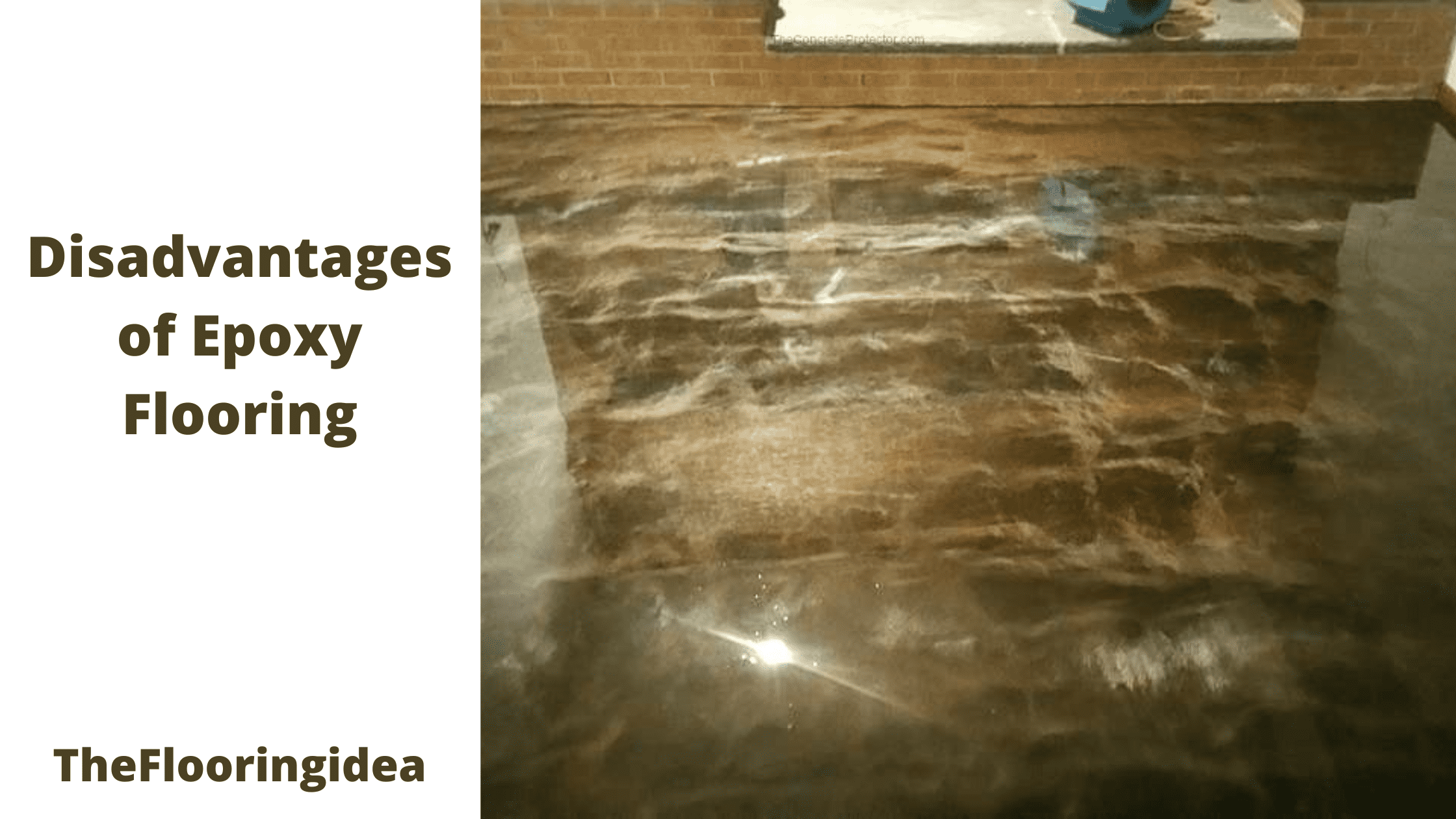Epoxy flooring is a popular choice for homeowners because it is durable and easy to clean. However, some disadvantages of epoxy flooring should be considered before making a decision.
Epoxy flooring is a relatively new technology, and as such, it has not been extensively tested over time.
But in this blog post, we’ll discuss both the pros and cons of epoxy flooring so that you can make an informed decision about whether it’s the right choice for your home.
Disadvantages of Epoxy Flooring
1. It Takes a Long Curing Time
One of the primary disadvantages of epoxy flooring is the fact that it takes a long time to cure. This can be a significant problem for busy households or businesses that don’t have the luxury of downtime.
Epoxy flooring needs to be cured for at least 24 hours before it can be used, and in some cases, it can take up to 72 hours.
This means that you have to plan ahead and make sure that you have enough time to let the epoxy flooring cure properly. Otherwise, you’ll be stuck with a sticky mess that’s impossible to use.
In addition, epoxy flooring is not always forgiving if you make a mistake during installation. Once the flooring has been laid down, it can be challenging to make corrections. This can lead to an uneven or imperfect finish.
2. Slippery
One of the disadvantages of Epoxy Flooring is that it can be “Slippery When Wet”. Although this may be seen as an advantage by some, it can also be a disadvantage.
Many people have been known to slip and fall on wet epoxy floors, and this can lead to serious injuries. In addition, epoxy floors are often very difficult to clean once they have become wet, and this can create a health hazard.
For these reasons, it is important to consider the disadvantages of Epoxy Flooring before choosing this type of flooring for your home or business.
3. Difficult to Repair
Epoxy flooring is a type of flooring that is made up of multiple layers of epoxy resin. So, it can be very difficult to repair if it becomes damaged.
Once the epoxy resin has been applied and cured, it is extremely hard to remove. This means that if a small section of the floor becomes cracked or chipped, it can be very difficult to fix without completely replacing the entire floor.
4. Hard to Remove
One of the biggest disadvantages of epoxy flooring is that it is prone to cracking and chipping. Over time, the surface of the epoxy can become dull and scratched, making it difficult to keep clean.
5. Not a Permanent Solution
If you are thinking of installing epoxy flooring in your home you should know the fact that epoxy flooring is a temporary flooring option. No doubt it is durable looks stylish and has many other qualities but eventually, you have to replace it.
In this situation putting down a new coat of epoxy after a few years could be a great option. Because eventually dropping heavy objects on the epoxy floor surface leads to cracking. And this can peel off a large area of the coated floor.
6. Difficult to Install as a DIY Project
The installation of an epoxy floor is not exactly a fun weekend project. In fact, it’s more of a pain than anything else. First, you have to remove all the furniture from the room and clear out any clutter.
Then, you have to clean the floor thoroughly and make sure it is completely dry before you can even start the installation process. Once you’re finally ready to begin, you have to mix the epoxy together and spread it onto the floor.
The entire process is messy, time-consuming, and requires a lot of patience. Not to mention, if you make even one tiny mistake, the whole thing can be ruined.
So, unless you’re prepared to deal with all of that, you might want to reconsider your decision to install an epoxy floor.
7. Smell
The smell of epoxy flooring is like nothing else. It’s a strong, chemical smell that can be overpowering, and it can stay in your nose for hours after you’ve left the area.
Epoxy flooring is made from a mixture of resin and hardener, and the fumes from these chemicals can be dangerous to your health.
Inhaling the fumes can cause headaches, dizziness, and nausea, and prolonged exposure can damage your lungs. The smell of epoxy flooring is one of its biggest disadvantages.
8. Not as Much Flexible
Epoxy flooring is not very flexible. This means that if you have any changes in your floor plan, or if you need to repair any damage to the floor, it can be very difficult to do so.
Moreover, it can be susceptible to staining. Poor Flexibility also can be an issue in areas where the floors are subject to heavy traffic or temperature changes.
Another downside of epoxy flooring is that it tends to show scratches and scuffs more easily than other types of flooring.
9. High Cost
One of the most significant disadvantages of epoxy flooring is its cost. Depending on the size and type of space, epoxy installation can be significantly more expensive than other types of flooring.
This high initial cost may not be offset by any savings from reduced maintenance or longevity, making it a difficult decision for many homeowners. Additionally, any customization such as color matching or specialized designs will increase the overall cost.
10. Limited Color Choices
Though it’s possible to customize the color or design of an epoxy floor, this will come at an added expense. Even if homeowners want to keep it simple with standard colors, there are only a few options available and they’re all quite basic.
This can be a major disadvantage for homeowners who are looking to add some flair to their flooring.
11. Environmental Impact
Epoxy is made up of urethane, which is derived from petroleum-based chemicals. Though it doesn’t necessarily have to be toxic, the chemicals used in epoxy flooring can be harmful to the environment and may not be the most eco-friendly flooring option.
Homeowners looking for sustainable options should look into other types of flooring that are more eco-friendly.
12. Limited Design Options
Epoxy flooring can be customized with colors and textures, but the options are limited compared to other types of flooring.
There is also a risk that fading or discoloration may occur over time due to exposure to UV light or extreme temperatures. Homeowners who want more design flexibility should look into other types of flooring such as tile or hardwood.
13. Not Pet-friendly
Epoxy is not the most pet-friendly type of flooring, as it can be slippery for animals and is prone to scratches from claws. Homeowners with pets should look into other types of flooring that are better suited for their furry friends, such as vinyl or bamboo.
14. Not Breathable
One of the less-discussed drawbacks of epoxy flooring is its non-breathability. This absence of breathability means that epoxy flooring does not allow trapped moisture to escape.
If the epoxy coating is applied over a damp substrate, moisture gets trapped between the two layers. Over time, this trapped moisture can create pressure, leading to a variety of problems such as blisters or bubbles on the surface of the floor.
This can eventually cause the epoxy coating to lose its bond with the substrate, leading to peeling or chipping. Therefore, if your space struggles with humidity or moisture, you’ll need to address this issue before considering an epoxy floor installation.
15. Not Ideal for Flexible Surfaces
Epoxy flooring is best suited for rigid, solid surfaces. Its inflexibility can cause problems if applied on a flexible surface such as suspended wooden floors or certain types of tiles.
Due to its inherent rigidity, epoxy is not designed to expand, contract, or flex along with the underlying surface. This characteristic can be problematic in environments where the floor is subject to significant changes in temperature, vibration, or physical pressure.
Such variations can cause the flexible surface to move or shift, leading to the epoxy coating developing cracks or even dislodging from the surface.
This can compromise both the aesthetic and functional quality of the floor, necessitating costly repairs or replacement. Therefore, careful consideration of the surface material is crucial before opting for an epoxy flooring solution.
Related Topics:
Advantages of Epoxy Flooring
1. Affordable
Epoxy flooring is the best way to make your home look more expensive without actually spending any money. It’s a simple process: first, you cover your existing floor with a layer of epoxy resin.
Then, you add a decorative topcoat, which can be anything from marble chips to glitter. The result is a luxurious-looking surface that is durable and easy to clean. Best of all, epoxy flooring is affordable for any budget.
So if you’re looking for a way to add some luxury to your home without breaking the bank, epoxy flooring is the way to go.
Related Topic: How Much Does Epoxy Flooring Cost?
2. Attractive Appearance
Epoxy flooring has a very high gloss finish that can make any space look more polished and professional. It is available in a variety of colors and designs.
3. Chemical Resistant
It is also resistant to chemicals, stains, and wear and tear. According to Wikipedia ” Hundreds of millions of dollars only in the United States are spent annually to correct moisture-related problems in flooring.
However, the epoxy moisture control system works like a chemical barrier that prevents the flooring from chemical and moisture damage.
Conclusion
Epoxy flooring is a popular choice for homeowners due to its durability and low maintenance requirements. However, it does have some drawbacks that should be considered before making the decision to install epoxy floors.
Homeowners should take into account factors such as cost, resale value, pet-friendliness, and noise pollution in order to make the best choice for their home.
Additionally, epoxy flooring is not ideal for areas that experience frequent moisture or temperature changes as these can cause the epoxy to warp and crack. Homeowners should speak with a professional contractor before deciding if epoxy is the right choice for them.
FAQ
Can I epoxy a wood floor?
Epoxy works pretty well over wood flooring but you can’t do this as a DIY project. It’s better to hire a professional for this.
Is epoxy flooring waterproof?
Epoxy floorings are claimed to be waterproof but the fact is they are temporarily waterproof. Because they have a thin top of sealant that repels water. So, you can say epoxy floorings are waterproof but for a short duration.
Is epoxy flooring toxic?
Nowadays epoxy floorings are considered non-toxic because of the curing process. However, epoxy has still a toxic smell so be aware before taking a deep breath until it completely dries out.



1 thought on “15 Disadvantages of Epoxy Flooring You Should Know”